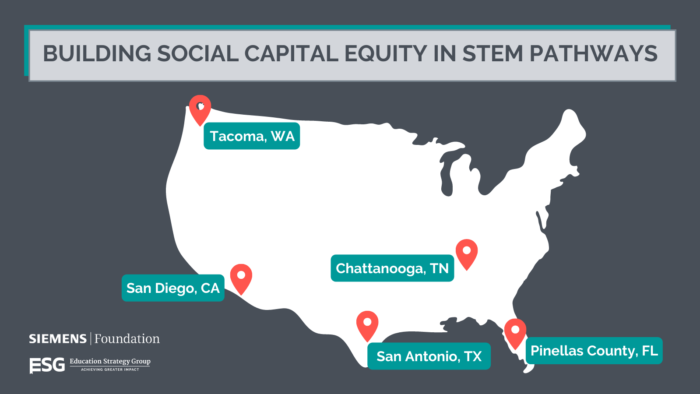Featured Work: Building Social Capital Equity in STEM Pathways
Social capital—or, simply put, “who we know”—can unlock and open doors to economic and career success for all learners. Unfortunately, slim but troubling data suggests that access to professional networks is inequitable because of systemic barriers within and beyond our school communities that contribute to employment inequities with lasting consequences, especially for students of color and those from low-income backgrounds.
Two-thirds of jobs are never posted, and three-quarters of job seekers find jobs through their personal and professional networks. If an individual does not have a direct or indirect connection to their field of interest, it is difficult for them to hear about, interview, and be hired for available jobs. However, communities can build sustainable solutions to this challenge with committed leadership and an intentional effort to make changes to our education system so that social capital is developed, measured, and valued.
With the generous support of the Siemens Foundation, Education Strategy Group (ESG) is leading a two-year initiative to support five geographically diverse communities in designing and implementing long-term strategies to build, expand, and mobilize the social capital of underrepresented learners, especially those within high school STEM pathways. The following communities and partners have been chosen for this project:

Chattanooga, TN
Public Education Foundation Chattanooga and Hamilton County Schools
With action-oriented district and community plans in place, strong community engagement through a cradle-to-career strategy, and innovative student options for early postsecondary and career engagement, Chattanooga has the strong foundation to embed social capital development into its college and career pathways and ensure its students are “Future Ready.”
Pinellas County, FL
Pinellas Education Foundation and Pinellas County Schools
Because of its commitment to multiple postsecondary pathways, its continuous efforts to expand CTE and work-based learning opportunities to all students, and the work already underway to help students build relationships with employers and mentors, Pinellas County Schools is ready to intentionally and systematically embed social capital development into its career pathways.
San Antonio, TX
SA WORX and San Antonio Independent School District
With ambitious college and career readiness goals in place within the district, the community and postsecondary partnerships to support this work, and expanding work-based learning opportunities for students through intermediary organizations, San Antonio has the collaborative environment that will allow social capital development practices to take root and grow.
San Diego, CA
San Diego State University Center for Equity and Postsecondary Attainment and San Diego Unified School District
Bringing a strong foundation laid by a close partnership between the district and San Diego State University, collaborative relationships with workforce organizations and postsecondary institutions, and committed engagement of students and alumni, San Diego will continue to strengthen student college and career pathways for all students, but especially those that have been historically underrepresented.
Tacoma, WA
Foundation for Tacoma Students and Tacoma Public Schools
Tacoma brings a strong collaborative of district, postsecondary, and community partners driving postsecondary and career goals, a state policy context receptive to innovation in college and career pathways, and budding social capital development already in place. The community is poised to elevate the importance of relationship and network building to equitable student success.
For each site, a leadership team made up of representatives from K-12, postsecondary education, employers, and community partners will identify the current social capital baseline for its students, help develop an equity-driven, sustainable plan for network development, and implement that plan in several pilot schools. The plans will embed social capital development systematically into career pathways, aligned advising, and work-based learning opportunities to build a standardized set of supports at each school.
Generally, each team will work toward systematically embedding equitable social capital development by:
- Increasing student awareness of high-value STEM careers;
- Teaching networking skills within career pathways;
- Providing workplace experiences that include intentionally growing professional relationships and finding occupational fit;
- Building near-peer mentoring programs to grow relationships that can be leveraged; and
- Ensuring employer commitment to supporting pathways work
By the end of the initiative, the communities will codify and incorporate social capital development strategies into systems, ensuring they are part of career pathways, work-based learning, and advising. They will work to increase both the networks of underrepresented students, including near-peer mentors, to grow their connections to high-value, entry-level STEM employment and the number of STEM employers providing WBL experiences that open doors to future employment. ESG will support sites in developing long-term plans for sustaining, replicating, and scaling based on key takeaways and lessons from their pilots.



